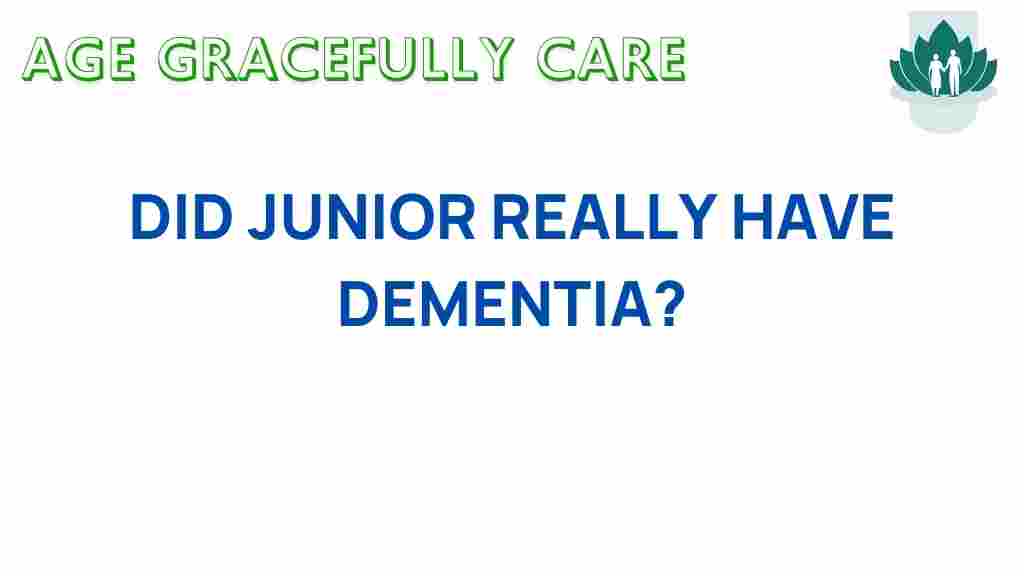Unraveling the Mystery: Did Junior Truly Suffer from Dementia?
Dementia is a term that encompasses a variety of cognitive decline symptoms affecting memory, thinking, and social abilities severely enough to interfere with daily life. In recent years, we have seen an increasing awareness of mental health issues, particularly dementia, and its impact on individuals and families. One of the poignant cases that have sparked discussions is that of Junior, who many believe suffered from dementia. In this article, we will delve deep into Junior’s situation, exploring the symptoms, diagnosis, familial impact, and the broader implications for healthcare and awareness regarding dementia.
Dementia: Understanding the Basics
Before we explore Junior’s story, it’s essential to understand what dementia is and how it presents itself. Dementia is not a single disease but rather a collection of symptoms that can include:
- Memory loss
- Difficulty in problem-solving
- Challenges in planning and organizing
- Confusion with time or place
- Changes in mood and behavior
These symptoms can vary significantly from person to person, leading to confusion about the diagnosis and the severity of the condition. Understanding the nuances of dementia is crucial for accurate diagnosis and effective management.
Junior’s Journey: A Case Study
Junior’s journey into cognitive decline began gradually, with subtle signs that were often overlooked by those around him. Initially, family members noticed minor memory lapses, such as forgetting names or misplacing everyday items. However, as time passed, these symptoms intensified, leading to significant concerns about his mental health.
The Diagnosis: Recognizing the Signs
Diagnosing dementia can be a complex process. It typically involves several steps, including:
- Medical History Review: Physicians start by taking a comprehensive medical history, which includes information about any previous neurological issues, family history of dementia, and current medications.
- Cognitive Testing: Specialized tests assess memory, problem-solving skills, and other cognitive functions. These tests help determine the extent of cognitive decline.
- Physical Exam: A physical examination may rule out other conditions that could be causing cognitive impairment.
- Brain Imaging: MRI or CT scans can identify changes in the brain that are associated with dementia.
In Junior’s case, the combination of cognitive testing and family observations led to a diagnosis of dementia. Although it was a relief to have a name for his condition, it also raised many questions about the future and quality of life.
Symptoms of Junior’s Condition
As Junior’s dementia progressed, the symptoms became more pronounced. Family members reported the following:
- Increased Memory Loss: Junior began to forget recent conversations and important dates, leading to frustration and confusion.
- Disorientation: On several occasions, he got lost in familiar places, raising concerns about his safety.
- Personality Changes: Junior became more withdrawn and exhibited mood swings, affecting family dynamics.
These changes not only impacted Junior but also had a significant effect on his family, creating a challenging emotional landscape.
The Family Impact of Junior’s Dementia
Dementia does not just affect the individual diagnosed; it profoundly impacts family members as well. Here are some ways in which Junior’s condition affected his family:
- Emotional Strain: Watching a loved one decline can lead to feelings of grief, frustration, and helplessness.
- Caregiving Responsibilities: Family members often take on caregiving roles, which can lead to physical and emotional exhaustion.
- Shifts in Family Dynamics: Roles within the family may shift, with some members becoming primary caregivers while others may take a step back.
The emotional and physical toll on the family cannot be understated. It is essential for families to seek support, whether through community resources or online platforms that offer guidance and emotional assistance.
For families like Junior’s, navigating the healthcare system can be daunting. Here are some tips for effectively managing dementia care:
- Stay Informed: Educate yourself about dementia and its progression. Knowing what to expect can help in planning for the future.
- Open Communication: Maintain an open dialogue with healthcare providers. Regular check-ups and assessments can ensure that care is tailored to the individual’s needs.
- Utilize Resources: There are numerous resources available for families dealing with dementia. Organizations like the Alzheimer’s Association provide valuable information and support.
Raising Awareness About Dementia
Awareness is a crucial aspect of managing dementia, both for individuals diagnosed and for their families. Increasing awareness can lead to earlier diagnosis and better support systems. Here are some strategies to raise awareness:
- Community Events: Organize or participate in community events focused on dementia education.
- Social Media Campaigns: Utilize social media platforms to share information and personal stories related to dementia.
- Educational Workshops: Host workshops to educate the public about the symptoms and impacts of dementia.
By fostering a community that understands dementia, we can create a supportive environment for those affected and their families.
Troubleshooting Tips for Families
Families facing the challenges of a loved one with dementia can benefit from some practical tips:
- Keep a Routine: Establishing a daily routine can help reduce confusion and provide a sense of stability for individuals with dementia.
- Use Memory Aids: Encourage the use of calendars, notes, and reminders to help manage memory loss.
- Stay Engaged: Engage in activities that promote cognitive function, such as puzzles, reading, or memory games.
These strategies can help improve the quality of life for both the individual and their family.
Conclusion: Moving Forward Together
Junior’s story is a compelling reminder of the profound effects of dementia—not just on the individual but on families and communities as well. Understanding the symptoms, diagnosis, and impact of dementia is crucial in fostering a compassionate and informed society.
By raising awareness, seeking proper healthcare, and supporting one another, we can navigate the challenges posed by dementia. It’s essential to remember that while dementia can be a daunting diagnosis, with the right knowledge and support, families can manage its impact effectively.
For further information on dementia and support resources, consider visiting the National Institute on Aging.
This article is in the category Health and created by AgeGracefullyCare Team
